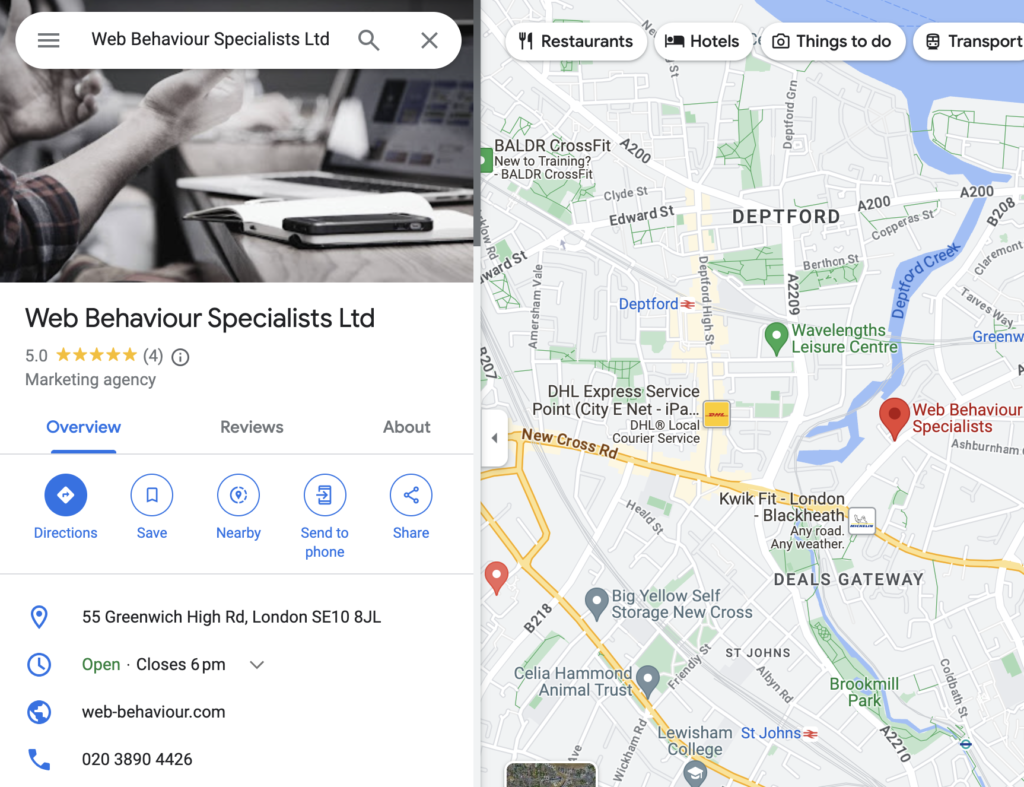Healthcare is an ever-expanding industry, and having a strong online presence is very important for any B2B healthcare company. Whether you have a business of medical devices or equipment, surgical machines, or hospital beds, healthcare B2B companies are beginning to reveal their latest technological advances that can improve the availability and efficiency of care. Healthcare businesses such as hospitals, clinics, and private practices have begun to adopt healthcare marketing strategies, and one of the most common but successful marketing tools is – Search Engine Optimisation (SEO).
| What is SEO and why is it important for your B2B healthcare business? Search Engine Optimisation drives organic traffic to your company’s website to increase your brand’s visibility on search engine result pages (SERPs) such as Google, Yahoo!, Bing and other search engine sites. Simply put, it is a process of moving your website to the top of the search engine pages to get more visitors to your website which ultimately leads to referrals and conversions. Healthcare SEO improves your company’s online presence, drives more traffic to your website, and solves the demands and challenges of healthcare B2B businesses. Healthcare SEO allows you to target specific keywords and demographics, ensure that your content reaches the right audience, increase brand awareness and authority, and generate more leads and website traffic. |
To generate leads and expand your business successfully, you should consider these SEO strategies:
1. Extensive Keyword Research
Keywords are the basic foundation of SEO. You need to identify and target the right keywords that your target audience would use when searching for B2B healthcare companies to improve your website’s visibility on search engine pages. Keyword research tools like Google Keyword Planner, Google Trends, SEMrush, Moz Keyword Explorer, and Google Analytics can help you find effective keywords, search volumes, competition, and other relevant data for your target audience. Brainstorm keywords like “medical device supplier”, “hospital equipment manufacturers”, “healthcare technology”, or “B2B healthcare solutions near me.”
Evaluate, filter, prioritise, and use selected keywords in your content, such as blog posts, product pages, case studies, service descriptions, or social media posts.
Note that keywords alone will not help you get business. The content must be of high quality, informative, and valuable to the target audience.
2. High-Quality Content
Once you have defined your medical keywords, it’s time to use those keywords in your content (blogs, product pages, case studies, service descriptions, and everything on your website). As a healthcare product or a service provider, you need to produce high-quality, informative, and interesting content to promote your products or services. Possible topics for healthcare B2B companies can also be industry trends, product guides and demonstrations, customer feedback testimonials, first-hand experience videos, health topics, or solutions offered by your company. Creating keyword-rich content that addresses the needs and concerns of your target audience is an integral part of any SEO strategy.
3. Get your business website up and running
Pair your keyword-rich content into your website to make it search-friendly for users. In simple terms, use your prepared keywords strategically in the titles, headings, meta descriptions, and throughout your content to entice users to visit your page. Write blog posts, articles, and web pages on common medical issues, patient care, and treatment. This can make you an authoritative source in the healthcare industry.
By adding links to your blog posts, people can find your content through search or other means. It is important to spread the word about your product/service, and new content. Help Google find your content by submitting a sitemap.
| A sitemap is a file on your site that tells search engines about new or changed pages on your site |

Your website is the first thing a user sees after clicking a link on a search page. Therefore, your website must be user-friendly and mobile-responsive. Google promotes websites that cater to both desktop and mobile visitors. They have now publicly stated that this has a major impact on rankings. Mobile-friendly websites improve the user experience, increase conversion rates, and are more flexible and cost-effective than mobile app development.
4. Use Google My Business for local healthcare SEO
Local SEO optimisation is essential for all healthcare B2B businesses. People look for healthcare providers or solutions, private clinics, and hospitals that are quick and close to home. According to the study, 87% of mobile phone owners use search engines every day, and searches for “local” + “business(es)” increased by more than 80 percent, including searches like “local businesses near me.”
To reach your target audience, you need to create and verify your Google My Business account. Create a detailed profile with photos, website, business hours, and updated address and contact information. Ask your customers to submit reviews on your Google page to help you improve your local search ranking and appear in the Google Maps Pack.
| The Google Map Pack is a prominent part of the Google Local Search Result page, showing the top local businesses for the location you’re searching for. Users can click on any business listing to get more information about the business, call a given phone number, or launch Google Maps to find the business location |
5. Follow Google’s E-E-A-T and YMYL guidelines
In December 2022, Google announced two factors that affect your website’s search engine rankings: Your Money or Your Life (YMYL) and Experience, Expertise, Authoritativeness, and Trustworthiness (E-E-A-T).
E-E-A-T is a set of criteria that Google uses to evaluate the quality and reliability of a website and its content.
Experience: Introduce the product by giving the first-hand life experience of an expert using it or talking to someone who has used the product.
Expertise: Make sure your website and its content are written by a healthcare professional. Highlight the contributors’ qualifications, certifications, and experience.
Authoritativeness: Provide accurate and well-researched information. Consider referrals to other reliable sources or websites.
Trust: Build trust with your audience by being transparent about your business and what it does. Clearly state your terms of use, privacy policy, and contact information. Avoid information that is false or misleading.
YMYL (Your Money or Your Life): According to Google, it is a web page or topic that can significantly affect your health, financial stability, happiness, or general well-being. Healthcare companies such as hospitals, clinics, and private practices fall into this category. Therefore, ensure the reliability of any medical information or claims made about your products and services. Consider adding disclaimers, accreditations, and real customer testimonials to your content.
6. Use video content
The least used when it comes to marketing strategies is video SEO. Many healthcare B2B companies choose blogs, posts, or infographics to generate leads. Your SEO efforts may be strengthened by optimising the video content with descriptive titles, keywords, and transcriptions. In B2B healthcare, you can create informative and engaging videos related to product demonstrations, tutorials, virtual tours, and expert interviews. This increases the time users spend on the website. What is more, it tells search engines that the page contains information useful for the users.
7. Measuring and tracking for SEO success
To improve your web presence, increase traffic, and generate leads and conversions, you should measure and track your SEO efforts. Here is a set of key metrics to help you make data-driven decisions and track the success of your SEO strategy:
- Click-through rate (CTR): measures the percentage of users who click on your organic search listings. A high CTR indicates the importance of your content
- Keyword ranking: monitors the ranking of your target keywords on search engine results pages (SERPs)
- Bounce rate: tracks the percentage of visitors who leave your site after viewing just one page. A high bounce rate can indicate inappropriate content or poor user experience
- Conversion rate: measures the percentage of visitors who take a desired action. Such as downloading brochures, subscribing to newsletters, or requesting a demo
- Page load speed: make sure that your website loads quickly as this is a ranking factor. Also it affects the user experience. Google’s PageSpeed Insights can help assess this
- Social shares: analyse the engagement metrics for your content, including time spent on the page, scroll depth, and social shares.
- Backlinks: monitor the number and quality of websites linking to your content. High-quality backlinks can improve your website’s authority and rankings
- Organic leads: calculate the number of leads generated through organic search channels. These can be submitting a contact form, registering via email, or doing a phone inquiry
- Voice search optimisation: as voice search becomes more common, make sure that your content is optimised for voice queries.
- Technical SEO: regularly audit and optimise the technical aspects of your website, such as XML sitemaps, robots.txt, and schema markup
- Competitor Analysis: compare your SEO performance with that of your healthy competitors in the industry. Identify gaps and opportunities
Partner with a healthcare SEO agency
These SEO strategies may look like your average SEO strategy, but they may be misleading. Healthcare SEO can be very difficult and limited for B2B companies. By using effective medical keywords, quality content, optimising your website, and tracking and measuring your SEO efforts, you can grow your B2B healthcare business and connect with other healthcare professionals or businesses.
To achieve your SEO goals and sustainably grow your healthcare B2B business, you should partner with a digital marketing agency and leverage the latest tools, techniques, and trends.
Web Behaviour Specialists (WBS) offers cutting-edge SEO strategies and comprehensive digital marketing solutions to help you achieve your business goals and stay competitive in the marketplace.
Contact us today to begin your journey to a successful online presence.








